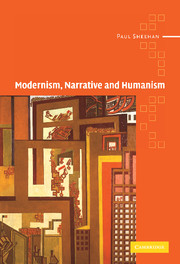Book contents
- Frontmatter
- Contents
- Preface
- Acknowledgments
- Introduction: The anthropometric turn
- 1 Narrating the animal, amputating the soul
- 2 Conrad and technology: homo ex machina
- 3 The Lawrentian transcendent: after the fall
- 4 Woolf's luminance: time out of mind
- 5 Doubting Beckett: voices descant, stories still
- Conclusion: Humanness unbound
- Notes
- Bibliography
- Index
3 - The Lawrentian transcendent: after the fall
Published online by Cambridge University Press: 06 July 2010
- Frontmatter
- Contents
- Preface
- Acknowledgments
- Introduction: The anthropometric turn
- 1 Narrating the animal, amputating the soul
- 2 Conrad and technology: homo ex machina
- 3 The Lawrentian transcendent: after the fall
- 4 Woolf's luminance: time out of mind
- 5 Doubting Beckett: voices descant, stories still
- Conclusion: Humanness unbound
- Notes
- Bibliography
- Index
Summary
[F]rom invertebrates to mammals, from mammals to man, from man to tribesman, from tribesman to me: and on and on, till, in the future, wonderful, distinct individuals, like angels, move about, each one being himself, perfect as a complete melody or a pure colour.
D. H. LawrenceAfter Marx, Nietzsche, Freud, and Heidegger, it is philosophically impossible to return to the idea that man is the owner and controller of the whole of his actions and ideas. We know how illusory and dangerous the negation of the unconscious, in all its various forms, can be.
Luc Ferry and Alain RenautDespite the seeming inescapability of philosophical antihumanism, inferred from Ferry and Renaut's acknowledgment, there is an equally unavoidable precariousness accompanying that disposition. For adherents of antihumanism are committed to avoiding both outright misanthropy (the human as an excrescence of the inhuman) and a simple reversal of priority that might favour the nonhuman over the human. The human, that is to say, must be disciplined (for its self-aggrandisement) but not disparaged. What is left, by way of counterhumanist strategy? Steering clear of misanthropy and logocentrism means, effectively, translating the human from value into fact, but without devaluing it; and this means, in turn, neutralising the human propensity to claim an a priori value for itself.
Philosophical antihumanism assays man as the ‘owner and controller’ of his actions by challenging the notion of the human as an absolute ground and standard of measure, as the uncaused causer of its own foundations.
- Type
- Chapter
- Information
- Modernism, Narrative and Humanism , pp. 87 - 120Publisher: Cambridge University PressPrint publication year: 2002



